初中情态动词讲解及练习
情态动词讲解以及倒装句练习40题(附答案)

may和might的用法 和 的用法
1. 表示许可。 表示请求、允许时,might比may的语气更委婉一些,否定回答时(口语中常 用) no , you can't . or , yes, please 用mustn't表示“不可以”、“禁止”、“阻 止”之意(具有强烈禁止的意思)如: You may drive the car. — Might I use your pen? — No, you mustn't. 用May I ... 征询对方许可在文体上比较正式,在口气上比较客气。在日常 口语中,用Can I ... 征询对方意见在现代口语中更为常见。
must和have to的用法 和 的用法
1. 表示必须、必要。(must表示主观多一些而have to则表示客观多一 些)如: You must come in time. 回答must引出的问句时,如果是否定的回答,不能用mustn't,而 要用needn't或don't have to。 — Must we hand in our exercise books today? — Yes, you must. (No, you don’t have to.)
Could 和 can 的用法
. 表示能力或客观可能性,还可以表示请求和允许。如: Can you finish this work tonight? Man can not live without air. — Can I go now? — Yes, you can. 注意:①could也可表示请求,语气委婉,主要用于疑问句,不可用于肯定句, 答语应用can(即could不能用于现在时态的简略答语中)。如: Could I come to see you tomorrow? Yes, you can. (否定答语可用No, I'm afraid not.) ②can表示能力时,还可用be able to代替。如: I'll not be able to come this afternoon.
初中英语情态动词练习
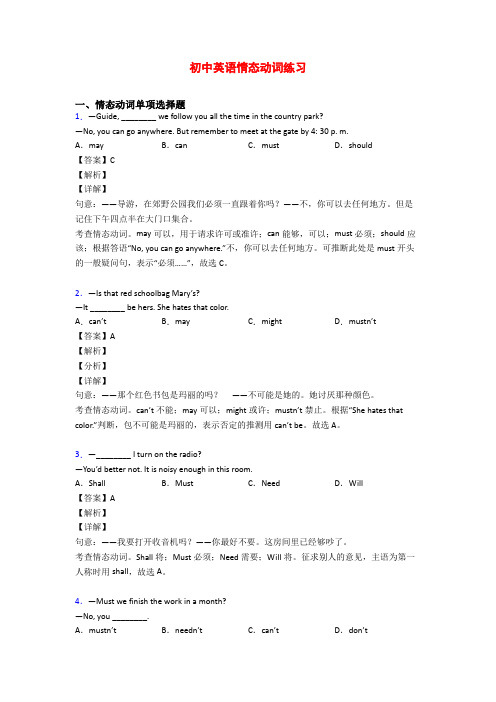
初中英语情态动词练习一、情态动词单项选择题1.—Guide, ________ we follow you all the time in the country park?—No, you can go anywhere. But remember to meet at the gate by 4: 30 p. m.A.may B.can C.must D.should【答案】C【解析】【详解】句意:——导游,在郊野公园我们必须一直跟着你吗?——不,你可以去任何地方。
但是记住下午四点半在大门口集合。
考查情态动词。
may可以,用于请求许可或准许;can能够,可以;must必须;should应该;根据答语“No, you can go anywhere.”不,你可以去任何地方。
可推断此处是must开头的一般疑问句,表示“必须……”,故选C。
2.—Is that red schoolbag Mary’s?—It ________ be hers. She hates that color.A.can’t B.may C.might D.mustn’t【答案】A【解析】【分析】【详解】句意:——那个红色书包是玛丽的吗?——不可能是她的。
她讨厌那种颜色。
考查情态动词。
can’t不能;may可以;might或许;mustn’t禁止。
根据“She hates that color.”判断,包不可能是玛丽的,表示否定的推测用can’t be。
故选A。
3.—________ I turn on the radio?—You’d better not. It is noisy enough in this room.A.Shall B.Must C.Need D.Will【答案】A【解析】【详解】句意:——我要打开收音机吗?——你最好不要。
这房间里已经够吵了。
考查情态动词。
Shall将;Must必须;Need需要;Will将。
全面解析初中英语情态动词100例与答案
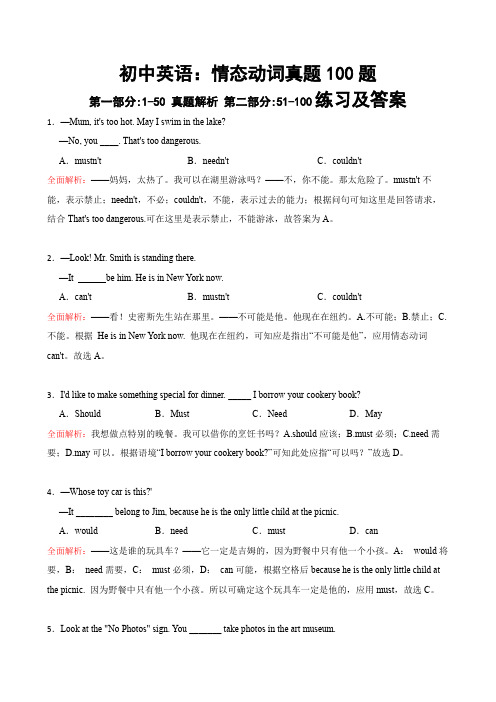
初中英语:情态动词真题100题第一部分:1-50 真题解析第二部分:51-100练习及答案1.—Mum, it's too hot. May I swim in the lake?—No, you ____. That's too dangerous.A.mustn't B.needn't C.couldn't全面解析:——妈妈,太热了。
我可以在湖里游泳吗?——不,你不能。
那太危险了。
mustn't不能,表示禁止;needn't,不必;couldn't,不能,表示过去的能力;根据问句可知这里是回答请求,结合That's too dangerous.可在这里是表示禁止,不能游泳,故答案为A。
2.—Look! Mr. Smith is standing there.—It be him. He is in New York now.A.can't B.mustn't C.couldn't全面解析:——看!史密斯先生站在那里。
——不可能是他。
他现在在纽约。
A.不可能;B.禁止;C.不能。
根据He is in New York now. 他现在在纽约,可知应是指出“不可能是他”,应用情态动词can't。
故选A。
3.I'd like to make something special for dinner. _____ I borrow your cookery book?A.Should B.Must C.Need D.May全面解析:我想做点特别的晚餐。
我可以借你的烹饪书吗?A.should应该;B.must必须;C.need需要;D.may可以。
根据语境“I borrow your cookery book?”可知此处应指“可以吗?”故选D。
4.—Whose toy car is this?'—It ________ belong to Jim, because he is the only little child at the picnic.A.would B.need C.must D.can全面解析:——这是谁的玩具车?——它一定是吉姆的,因为野餐中只有他一个小孩。
情态动词的用法及练习(附答案)

情态动词的⽤法及练习(附答案)情态动词的⽤法及专项练习第1 & 2类:第3类1.could have p.p.①指过去某事有可能发⽣, 但并未.真的..发⽣。
They could have won the race, but they didn't try hard enough.He could have studied harder, but he was too lazy and that's why he failed the exam.②指过去有能⼒做某事, 但并未真的...做过。
I could have stayed up late, but I decided to go to bed early.Julie could have bought the book, but she borrowed it from the library instead.③对过去的发⽣事情做出⼀种猜测,但实际上并不知道真假。
仅仅是做⼀种观点上的表达。
He could have got stuck in traffic.He could have forgotten that we were meeting today.He could have overslept.2. may / might have p.p.(⽤法与could have p.p.第③点相同)对过去的发⽣事情做出⼀种猜测,但实际上并不知道真假。
仅仅是做⼀种观点上的表达。
He might have got stuck in traffic.He might have forgotten that we were meeting today.He might have overslept.3. couldn't have p.p.渴望、期望做某事, 但由于外部原因不可能做成, 即便是很想做。
是⼀种虚拟语⽓。
初中英语中的情态动词用法解析

初中英语中的情态动词用法解析情态动词是英语中一个非常重要的语法现象,它们在句子中起到了承上启下的作用。
在初中英语学习中,我们经常会遇到情态动词的使用,但是很多学生对其用法还存在一些困惑。
本文将详细解析初中英语中的情态动词用法,帮助大家更好地理解和运用。
一、情态动词的定义和特点情态动词是一类特殊的助动词,用来表示说话人对某种行为或状态的态度、意愿、推测、能力等。
常见的情态动词包括can、could、may、might、must、shall、should、will、would等。
情态动词具有以下特点:1. 情态动词没有人称和数的变化,即主语是什么,情态动词就是什么形式。
2. 情态动词后面直接跟动词原形,不加to。
3. 情态动词本身没有时态,它们通过上下文来表示不同的时态。
4. 情态动词后面的动词要用原形,不能加-ing。
二、情态动词的用法1. 表示能力和可能性情态动词can表示能力,表示某人有能力做某事。
例如:I can swim.(我会游泳。
)情态动词may表示可能性,表示某事有可能发生。
例如:It may rain tomorrow.(明天可能会下雨。
)2. 表示许可和禁止情态动词can表示许可,表示某人允许做某事。
例如:Can I go to the park?(我可以去公园吗?)情态动词must表示禁止,表示某人不允许做某事。
例如:You must not smoke here.(你不能在这里吸烟。
)3. 表示推测和猜测情态动词may和might表示推测,表示某事可能发生或某人可能做某事。
例如:He may be busy.(他可能很忙。
)情态动词must表示肯定的推测,表示某事几乎可以肯定。
例如:She must be tired.(她一定很累。
)4. 表示义务和建议情态动词must表示义务,表示某人有责任做某事。
例如:You must finish your homework.(你必须完成作业。
初中语法:情态动词知识点练习题

初中语法:情态动词知识点练习题一、情态动词单项选择题1.— Is the boy over there Tom? He often wears a jacket like that.— It _______ be him. He is absent from school today.A.needn’t B.shouldn’t C.mustn’t D.can’t【答案】D【解析】【详解】句意:——那边的男孩是汤姆吗?他经常穿那样的夹克。
——那不可能是他。
他今天没来上学。
考查情态动词。
n eedn’t不必;shouldn’t不应该;mustn’t禁止;can’t不可能。
根据“He is absent from school today”可知,推测那个男孩一定不是汤姆,否定推测用can’t,故选D。
2.—I think they are enough. We ________ make so many chairs.—I don’t think so. Because nearly a quarter of them need ________.A.don’t need to; men ding B.needed; to be mendedC.don’t need; mend D.need; to mend【答案】A【解析】【详解】句意:——我想足够了。
我们不需要做这么多椅子。
——我不这么认为。
因为将近四分之一需要修理。
考查need的用法。
根据“I think they are enough. ”可知,第一处表示“不需要”,排除BD。
need doing=need to be done表被动,故选A。
3.— I think it will be sunny tomorrow.— It ________ be fine. But the weather always changes quickly.A.may B.may not C.must D.must not【答案】A【解析】【分析】【详解】句意:——我觉得明天会是晴天。
中考初中语法祈使句情态动词专题讲解与练习

中考初中语法祈使句情态动词专题讲解与练习情态动词一.情态动词can_________________ can’t_____________________May_________________ may not______________________Must______________ mustn’t_______________________二、情态动词的特点1. 情态动词无人称和数的变化,2. 情态动词后面跟的动词需用原形,否定式构成是在情态动词后面加 "not"。
3. 个别情态动词有过去式, 过去式用来表达更客气, 委婉的语气, 时态性不强, 可用于过去,现在。
三、情态动词的用法1. can/could;can’t/couldn’t (否定)1) 表示能力, 意为“能、会”, 例如:I can speak a little English. -- Can you ride a bike?I can’t swim. -- Yes, I can. / No, I can’t.2) 表示请求或允许,多用于口语中,意为“可以、能”等You can go home now. 现在你可以回家了 -- Can I borrow your bike?You can’t stop your car here. -- Yes, you can. / No, you can’t.3) 用于否定句、疑问句中,表示猜测、怀疑或不肯定.Lucy can’t be at home now, she went to the park just now.Where can it be? I can’t find my football.【注意:】1). could 是can的过去式, 有两种用法, 一种表示过去式;一种用来表达更加客气, 委婉的语气, 时态性不强, 可用于过去,现在。
2). be able to 意为“有能力,能够做...”, 相当于can/could, 但它有人称,数和时态的变化。
初中英语情态动词详细用法归纳(含练习及答案)
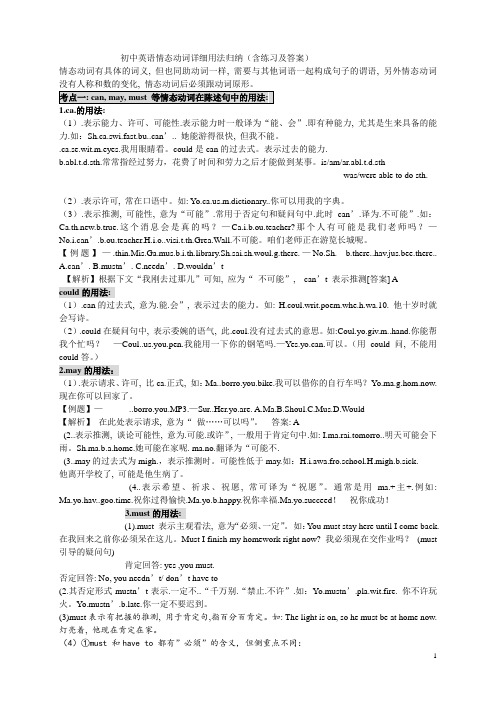
初中英语情态动词详细用法归纳(含练习及答案)情态动词有具体的词义, 但也同助动词一样, 需要与其他词语一起构成句子的谓语, 另外情态动词没有人称和数的变化, 情态动词后必须跟动词原形。
1.ca.的用法:(1).表示能力、许可、可能性.表示能力时一般译为“能、会”.即有种能力, 尤其是生来具备的能力.如:Sh.ca.swi.fast.bu..can’.. 她能游得很快, 但我不能。
.ca.se.wit.m.eyes.我用眼睛看。
could是can的过去式。
表示过去的能力.b.abl.t.d.sth.常常指经过努力,花费了时间和劳力之后才能做到某事。
is/am/ar.abl.t.d.sthwas/were able to do sth.(2).表示许可, 常在口语中。
如: .m.dictionary..你可以用我的字典。
(3).表示推测, 可能性, 意为“可能”.常用于否定句和疑问句中.此时can’.译为.不可能”.如:Ca.th.new.b.true.这个消息会是真的吗?—Ca.i.b.ou.teacher?那个人有可能是我们老师吗?—No.i.can’.b.ou.teacher.H.i.o..visi.t.th.Grea.Wall.不可能。
咱们老师正在游览长城呢。
【例题】—.thin.Mis.Ga.mus.b.i.th.library.Sh.sai.sh.woul.g.there.—No.Sh.__b.there..hav.jus.bee.there..A.can’.B.mustn’.C.needn’.D.wouldn’t【解析】根据下文“我刚去过那儿”可知, 应为“不可能”, can’t 表示推测[答案] Acould的用法:(1).can的过去式, 意为.能.会”, 表示过去的能力。
如: H.coul.writ.poem.whe.h.wa.10. 他十岁时就会写诗。
(2).could在疑问句中, 表示委婉的语气, 此.coul.没有过去式的意思。
情态动词与虚拟语气讲解及练习题应用

情态动词与虚拟语气一. 含义和特征1. 含义: 情态动词是表示情态意义的动词, 它表示说话人的语气和情态, 它不能单独作谓语, 必须与实义动词一起构成谓语, 情态动词没有人称和数的变化。
2. 特征:①有词义但不完整, 不能单独作谓语, 要跟实意动词或系动词的原形作谓语。
②除have to外, 可适用于各种人称和数。
③有些情态动词有过去式。
二. 基本用法1. can/ could和be able to①can/ could表示能力, 这时could 为can 的过去时。
I can climb the cliff. He can drivea car. We could sing the song when I was young.②表示许可。
You can sit here. The plane can take off now. 在疑问句中could比can委婉, 回答用can。
Can/ Could I come here tomorrow? Yes, you can.③表示“有时候可能会”。
Even an experienced teacher can make a mistake. To stay here could be better.④表示说话人的推测、怀疑、惊异、猜测、不肯定或不耐烦等,主要用于否定句, 疑问句或感叹句中。
The story can’t be true. How could you be so careless! Where can he go?⑤cannot…too/ enough意为无论怎么…也不过分, 越…越好。
You cannot be too careful. You cannot remember enough English words.⑥can和be able to都表示能力, 意思上没多大区别。
can只有can和could两种形式, 而be able to则有am/ is/ are/ was/ were able to, will/ shall be able to, have/ has/ had been able to等形式。
助动词与情态动词讲解及练习题

助动词与情态动词一、助动词助动词有be, have, do, will, shall。
它们本身没有词义,只和实义动词的一定形式构成复合谓语,用来表示时态和语态,构成否定、疑问及加强语气等。
1、be (am, is, are, were, been)(l)“be + -ing”构成进行时态;(2)“be + 过去分词”构成被动语态;(3)“be + 动词不定式”构成复合谓语:①表按计划安排要发生的事。
The prime minister is to visit Japan next year.总理将于明年访问日本。
②用于命令。
You're to do your homework before you watch TV.你得做完了作业才能看电视。
2、have (has, had)(1)“have+过去分词”构成完成时态。
如:Have you seen the film ?(2)“have been + -ing”构成完成进行时态。
如:What have you been doing these days? 这些日子你一直在干什么?3、do (does, did)(1)“do not + 动词原形”构成行为动词的否定式。
如:His brother doesn’tlike playing basket.;(2)“Do + 主语 + 动词原形”构成行为动词的一般疑问句。
Does he go toschool by bike every day? (3)“do + 动词原形”用于祈使句或陈述句中表示加强语气。
如:I did go to see him, but he wasn’t in我确实去看望他了,但他不在家。
Do do some work. 请一定做点什么;(4)代替前面刚出现的动词以避免重复。
My mother told me to go to bed early.So I did.4、will, shall (would, should)“will (shall+动词原形)”构成一般将来时,一般来说,shall用于第一人称,will用于第二人称或第三人称,口语中常用will代替shll,如:We will have a meeting to discuss the problem.二、情态动词情态动词表示说话人对某一动作或状态的态度,可以表示“可能”、“可以”、“需要”、“必须”或“应当”等之意。
(完整版)初中英语情态动词专项练习题
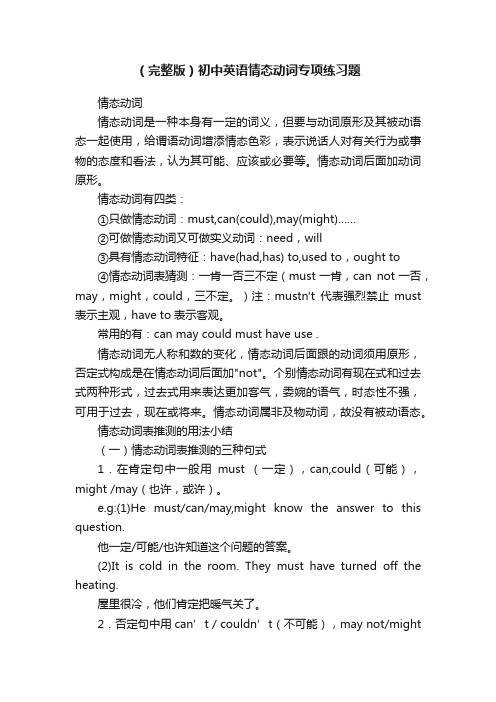
(完整版)初中英语情态动词专项练习题情态动词情态动词是一种本身有一定的词义,但要与动词原形及其被动语态一起使用,给谓语动词增添情态色彩,表示说话人对有关行为或事物的态度和看法,认为其可能、应该或必要等。
情态动词后面加动词原形。
情态动词有四类:①只做情态动词:must,can(could),may(might)……②可做情态动词又可做实义动词:need,will③具有情态动词特征:have(had,has) to,used to,ought to④情态动词表猜测:一肯一否三不定(must一肯,can not一否,may,might,could,三不定。
)注:mustn't代表强烈禁止must 表示主观,have to表示客观。
常用的有:can may could must have use .情态动词无人称和数的变化,情态动词后面跟的动词须用原形,否定式构成是在情态动词后面加"not"。
个别情态动词有现在式和过去式两种形式,过去式用来表达更加客气,委婉的语气,时态性不强,可用于过去,现在或将来。
情态动词属非及物动词,故没有被动语态。
情态动词表推测的用法小结(一)情态动词表推测的三种句式1.在肯定句中一般用must (一定),can,could(可能),might /may(也许,或许)。
e.g:(1)He must/can/may,might know the answer to this question.他一定/可能/也许知道这个问题的答案。
(2)It is cold in the room. They must have turned off the heating.屋里很冷,他们肯定把暖气关了。
2.否定句中用can’t / couldn’t(不可能),may not/mightnot(可能不)。
e.g:(1)It can’t/couldn’t be the headmaster. He has gone to America.这不可能是校长,他去美国了。
初中英语语法:情态动词讲解及练习
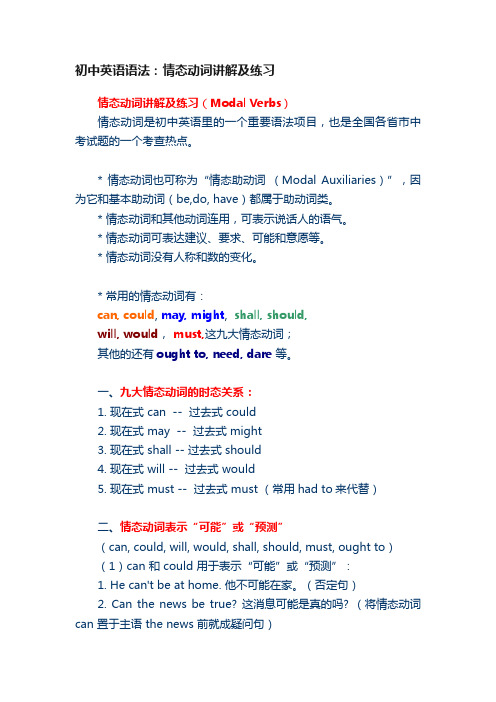
初中英语语法:情态动词讲解及练习情态动词讲解及练习(Modal Verbs)情态动词是初中英语里的一个重要语法项目,也是全国各省市中考试题的一个考查热点。
* 情态动词也可称为“情态助动词(Modal Auxiliaries)”,因为它和基本助动词(be,do, have)都属于助动词类。
* 情态动词和其他动词连用,可表示说话人的语气。
* 情态动词可表达建议、要求、可能和意愿等。
* 情态动词没有人称和数的变化。
* 常用的情态动词有:can, could, may, might, shall, should,will, would,must,这九大情态动词;其他的还有ought to, need, dare等。
一、九大情态动词的时态关系:1. 现在式 can -- 过去式 could2. 现在式 may -- 过去式 might3. 现在式 shall -- 过去式 should4. 现在式 will -- 过去式 would5. 现在式 must -- 过去式 must (常用had to来代替)二、情态动词表示“可能”或“预测”(can, could, will, would, shall, should, must, ought to)(1)can 和 could 用于表示“可能”或“预测”:1. He can't be at home. 他不可能在家。
(否定句)2. Can the news be true? 这消息可能是真的吗? (将情态动词can 置于主语 the news 前就成疑问句)3. Anybody can make mistake. 任何人都可能犯错误。
(只表示理论上的可能性)(2)may 和 might 用于表示“事实上的可能性”或“预测”:1. It may rain tomorrow. (表示可能会发生)明天可能会下雨。
2. It may snow later this afternoon. (表示预测)今天下午可能会下雪。
情态动词专项练习及答案详解
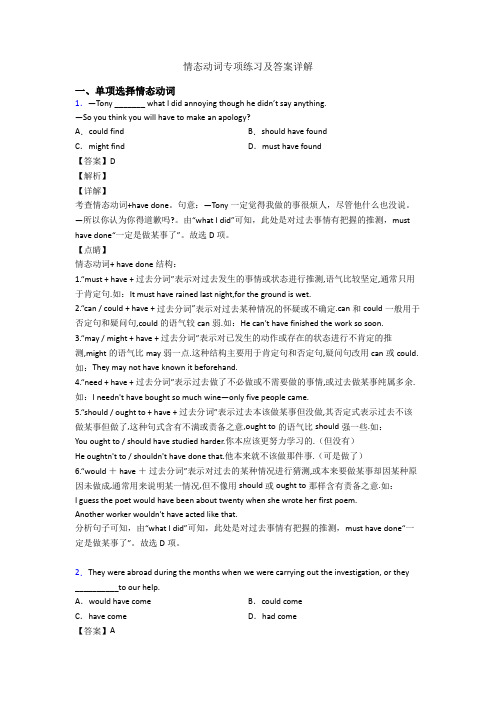
情态动词专项练习及答案详解一、单项选择情态动词1.—Tony _______ what I did annoying though he didn’t say anything.—So you think you will have to make an apology?A.could find B.should have foundC.might find D.must have found【答案】D【解析】【详解】考查情态动词+have done。
句意:—Tony一定觉得我做的事很烦人,尽管他什么也没说。
—所以你认为你得道歉吗?。
由“what I did”可知,此处是对过去事情有把握的推测,must have done“一定是做某事了”。
故选D项。
【点睛】情态动词+ have done结构:1.“must + have + 过去分词”表示对过去发生的事情或状态进行推测,语气比较坚定,通常只用于肯定句.如:It must have rained last night,for the ground is wet.2.“can / could + have + 过去分词”表示对过去某种情况的怀疑或不确定.can和could一般用于否定句和疑问句,could的语气较can弱.如:He can't have finished the work so soon.3.“may / might + have + 过去分词”表示对已发生的动作或存在的状态进行不肯定的推测,might的语气比may弱一点.这种结构主要用于肯定句和否定句,疑问句改用can或could.如:They may not have known it beforehand.4.“need + have + 过去分词”表示过去做了不必做或不需要做的事情,或过去做某事纯属多余.如:I needn't have bought so much wine—only five people came.5.“should / ought to + have + 过去分词”表示过去本该做某事但没做,其否定式表示过去不该做某事但做了,这种句式含有不满或责备之意,ought to的语气比should强一些.如:You ought to / should have studied harder.你本应该更努力学习的.(但没有)He oughtn't to / shouldn't have done that.他本来就不该做那件事.(可是做了)6.“would + have +过去分词”表示对过去的某种情况进行猜测,或本来要做某事却因某种原因未做成,通常用来说明某一情况,但不像用should或ought to那样含有责备之意.如:I guess the poet would have been about twenty when she wrote her first poem.Another worker wouldn't have acted like that.分析句子可知,由“what I did”可知,此处是对过去事情有把握的推测,must have done“一定是做某事了”。
(完整)初一情态动词讲解及练习附答案
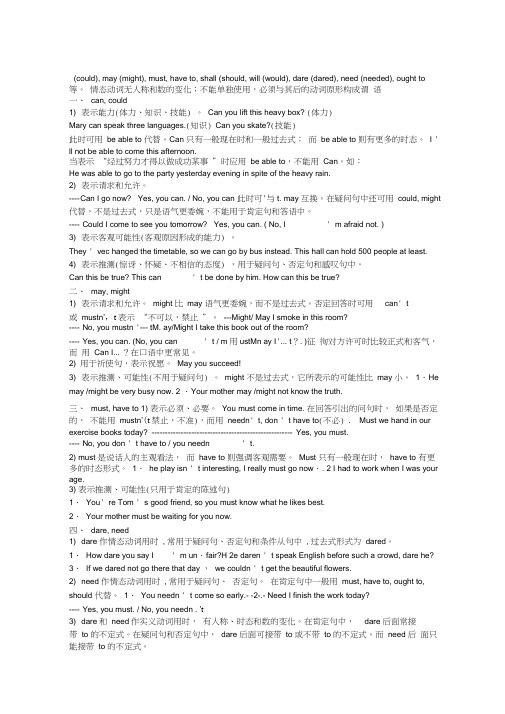
(could), may (might), must, have to, shall (should, will (would), dare (dared), need (needed), ought to 等。
情态动词无人称和数的变化;不能单独使用,必须与其后的动词原形构成谓语一、can, could1) 表示能力(体力、知识、技能) 。
Can you lift this heavy box? (体力)Mary can speak three languages.(知识) Can you skate?(技能)此时可用be able to 代替。
Can 只有一般现在时和一般过去式;而be able to 则有更多的时态。
I ' ll not be able to come this afternoon.当表示“经过努力才得以做成功某事”时应用be able to,不能用Can。
如:He was able to go to the party yesterday evening in spite of the heavy rain.2) 表示请求和允许。
---- C an I go now? Yes, you can. / No, you can 此时可'与t. may 互换。
在疑问句中还可用could, might 代替,不是过去式,只是语气更委婉,不能用于肯定句和答语中。
---- Could I come to see you tomorrow? Yes, you can. ( No, I ' m afraid not. )3) 表示客观可能性(客观原因形成的能力) 。
They ' vec hanged the timetable, so we can go by bus instead. This hall can hold 500 people at least. 4) 表示推测(惊讶、怀疑、不相信的态度) ,用于疑问句、否定句和感叹句中。
初中情态动词表的用法推测及练习(经典)

初中情态动词表的用法推测及练习(经典)本文档旨在提供初中学生关于情态动词用法推测及练方面的指导。
下方是一份经典的初中情态动词表,供学生参考和练。
用法推测Can / Could- 表示能力或可能性:He [can/could] swim very fast. (他会游泳很快。
)- 表示请求或允许:[Can/Could] you help me with the homework? (你能帮我做作业吗?)May / Might- 表示可能性或允许:We [may/might] go to the ___(我们明天可能去公园。
)- 表示推测或建议:He [may/might] be late for the meeting. (他可能会迟到开会。
)___- 表示将来的行为:I [shall/should] ___我这个周末会去看望我祖父母。
)- 表示义务或建议:You [should] study hard for the exam. (你应该为考试而努力研究。
)Will / Would- 表示将来的行动或意愿:He [will/would] buy a new car. (他想买一辆新车。
)- 表示请求或邀请:[Will/Would] you please pass me the salt? (请你把盐递给我好吗?)Must- 表示必须性或推测:I [must] ___ before going out. (我必须在出门之前完成作业。
)- 表示肯定的推测:He [must] be tired after running for so long. (他跑了这么久肯定累了。
)___- 表示应该或建议:You [ought to] apologize to your friend. (你应该向你的朋友道歉。
)练根据上述情态动词的用法推测,完成以下句子:1. I __________ swim when I was five years old. (我五岁的时候能游泳。
初中英语情态动词讲解-练习及答案
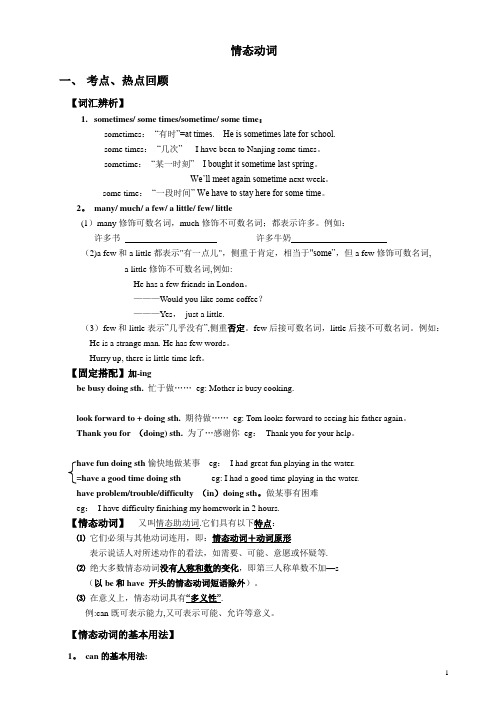
情态动词一、考点、热点回顾【词汇辨析】1.sometimes/ some times/sometime/ some time:sometimes:“有时”=at times. He is sometimes late for school.some times:“几次” I have been to Nanjing some times。
sometime:“某一时刻” I bought it sometime last spring。
We’ll meet again sometime next week。
some time:“一段时间” We have to stay here for some time。
2。
many/ much/ a few/ a little/ few/ little(1)many修饰可数名词,much修饰不可数名词;都表示许多。
例如:许多书许多牛奶(2)a few和a little都表示"有一点儿",侧重于肯定,相当于"some”,但a few修饰可数名词,a little修饰不可数名词,例如:He has a few friends in London。
———Would you like some coffee?———Yes,just a little.(3)few和little表示”几乎没有”,侧重否定。
few后接可数名词,little后接不可数名词。
例如:He is a strange man. He has few words。
Hurry up, there is little time left。
【固定搭配】加-ingbe busy doing sth.忙于做……eg: Mother is busy cooking.look forward to + doing sth. 期待做……eg: Tom looks forward to seeing his father again。
初中情态动词的用法猜测及练习(经典)
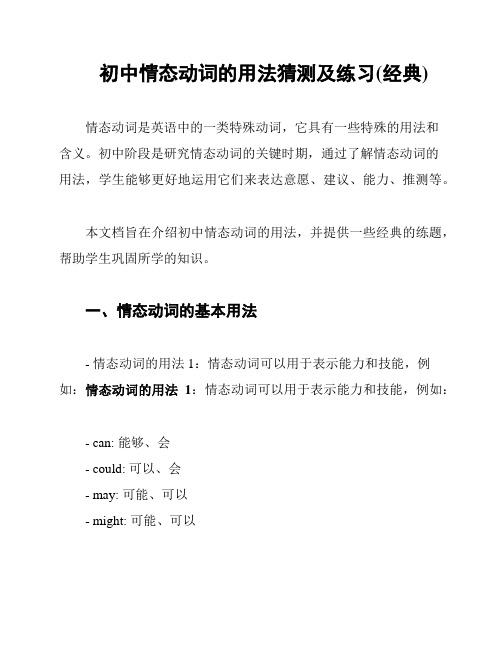
初中情态动词的用法猜测及练习(经典)情态动词是英语中的一类特殊动词,它具有一些特殊的用法和含义。
初中阶段是研究情态动词的关键时期,通过了解情态动词的用法,学生能够更好地运用它们来表达意愿、建议、能力、推测等。
本文档旨在介绍初中情态动词的用法,并提供一些经典的练题,帮助学生巩固所学的知识。
一、情态动词的基本用法- 情态动词的用法1:情态动词可以用于表示能力和技能,例如:情态动词的用法1:情态动词可以用于表示能力和技能,例如:- can: 能够、会- could: 可以、会- may: 可能、可以- might: 可能、可以- 情态动词的用法2:情态动词可以用于表示推测和猜测,例如:情态动词的用法2:情态动词可以用于表示推测和猜测,例如:- must: 必须、一定- should: 应该、应当- ought to: 应该、应当- might: 可能、也许- 情态动词的用法3:情态动词可以用于表示意愿和建议,例如:情态动词的用法3:情态动词可以用于表示意愿和建议,例如:- would: 愿意、将要- should: 应该、应当- ought to: 应该、应当二、练题以下是一些经典的情态动词练题,供学生参考和练:1. 选择合适的情态动词填空:- I __________ go to the party with you, but I have to study for the test tomorrow.- He __________ be a doctor when he grows up.2. 根据语境选择合适的情态动词填空:- A: Can you help me with this math problem?B: Of course! I __________ help you.- A: It's late. We should go home now.B: You're right. We __________ leave.3. 根据句意写出合适的情态动词:- You __________ call your parents and tell them you'll be home late.- I'm not sure, but he __________ be at the library.以上是一些情态动词的用法及练题,学生可以通过不断的练来加深对情态动词的理解和运用。
- 1、下载文档前请自行甄别文档内容的完整性,平台不提供额外的编辑、内容补充、找答案等附加服务。
- 2、"仅部分预览"的文档,不可在线预览部分如存在完整性等问题,可反馈申请退款(可完整预览的文档不适用该条件!)。
- 3、如文档侵犯您的权益,请联系客服反馈,我们会尽快为您处理(人工客服工作时间:9:00-18:30)。
情态动词1.can (could)1)表示能力,could主要指过去时间。
Two eyes can see more than one. 两只眼比一只眼看得清。
Could the girl read before she went to school? 这女孩上学前能识字吗?2)表示可能(理论上或是逻辑判断上)。
He can’t (couldn’t) have enough money for a new car. 他不可能有足够的钱买新车。
You mustn't smoke while you're walking around in the wood. You could start a fire.在林子里走时勿吸烟,那样可能会引起火灾。
3)表示允许。
Can I have a look at your new pen? 我可以看一看你的新钢笔吗?He asked whether he could take the book out of the reading-room.他问他可不可以把书带出阅览室。
4)表惊异、怀疑、不相信等态度。
主要用于否定句、疑问句或感叹句中。
Where can (could) they have gone to? 他们会去哪儿了呢?He can’t (couldn’t) be over sixty. 他不可能超过六十岁。
How can you be so careless? 你怎么这么粗心?5)比较委婉客气地提出问题或陈述看法。
Can (Could) you lend me a hand? 帮我一把好吗?I’m afraid we couldn’t give you an answer today. 恐怕我们今天不能给你答复。
2.may (might)1)表允许,might可以指过去时间,也可指现在时间,语气更委婉。
You may take whatever you like. 你喜欢什么就拿什么。
He told me that I might smoke in the room. 他告诉我可以在房间里抽烟。
May (Might) I ask for a photo of your baby? 我可以要一张你宝宝的照片吗?在回答以may引起的问句时,多避免用这个词,而用其它方式,如:Yes, please. / Certainly. / Please don’t ./ You’d better not. / No, you mustn’t.等,以免显得太严峻或不客气。
2)表可能(事实上)。
可以指过去时间,也可以指现在时间,但语气更加不肯定。
He may be at home. 他可能在家。
She may not know about it. 她可能不知道这件事。
He was afraid they might not agree with him. 他担心他们可能不同意他的意见。
They might be having a meeting, but I’m not sure. 他们有可能在开会,不过我不肯定。
3. must1)表示义务。
意为“必须”(主观意志)。
We must do everything step by step. 我们一切都必须循序渐进地做。
You mustn’t talk to her like that. 你不可能那样对她说话。
--Must we hand in our exercise—books now? 我们现在就要交练习本吗?--No, you needn’t. / No, you don’t have to. 不必。
2)表示揣测。
意为“想必、准是、一定”等,只用于肯定句。
He must be ill. He looks so pale. 他准是病了。
他的脸色苍白。
She’s wearing a diamond necklace. She must have a lot of money. 她戴着钻石项链,一定很有钱。
4. shall1)表征询意见,用于第一、第三人称疑问句。
Shall I get you some tea? 我给你点茶好吗?Shall the boy wait outside? 让那男孩在外面等吗?What shall we do this evening? 我们今晚做什么?2)表说话人的意愿,有“命令、允诺、警告、决心”等意思,用于第二、第三人称陈述句。
You shall do as I say. 按我说的做。
(命令)You shall have my answer tomorrow. 你明天可以得到我的答复。
(允诺)He shall be sorry for it one day, I tell you. 有一天他会后悔的,我告诉你。
(警告)Nothing shall stop us from carrying out the plan. 什么也不能阻止我们执行这项计划。
(决心)5. will1)表意愿,用于各种人称陈述句。
I will do anything for you. 我愿为你做任何事。
None is so blind as those who won’t see. 不愿看的人眼最瞎。
If you will read the book, I’ll lend it to you. 如果你愿意读这本书,我会把它借给你。
2)表请求,用于疑问句。
Will you close the window? It’s a bit cold. 请你把窗户关上好吗?有点冷。
Won’t you drink some more coffee? 再来一点咖啡好吗?3)表示某种倾向或习惯性动作。
Fish will die out of water. 鱼离开水就不能活。
The door won’t open. 这门打不开。
The boy will sit there hour after hour looking at the traffic go by.那男孩常常坐在那里好几个钟点,看着车辆行人通过。
6. should1)表义务。
意为“应该”(某件事宜于做),用于各种人称。
You should be polite to your teachers. 你对老师应该有礼貌。
You shouldn’t waste any time. 你不应该浪费时间。
2)表推测,意为“想必一定、照说应该、估计”等。
The film should be very good as it is starring first-class actors.这部新电影是一流演员主演的,估计拍得很好。
They should be home by now. 照说他们现在应当已经到家了。
7.would1)表意愿。
They would not let him in because he was poorly dressed. 他们不让他进去因为他衣着破旧。
I said I would do anything for you. 我说过我愿意为你做任何事。
2)表委婉地提出请求、建议或看法。
Would you like another glass of beer? 再来杯啤酒好吗?Would you mind cleaning the window? 请把窗户擦一下好吗?They wouldn’t have anything against it. 他们不会有什么反对意见。
3)表过去反复发生的动作或过去的一种倾向。
Every time she was in trouble, she would go to him for help.她每遇到麻烦都会向她求助。
他告诉我盒子打不开了。
8. ought to1)表义务,意为“应该”(因责任、义务等该做),口气比should稍重。
You are his father. You ought to take care of him. 你是他父亲,应当管他。
You oughtn’t to smoke so much. 你不应该抽这么多烟。
2)表推测,暗含很大的可能,语气较弱。
Han Mei ought to know his telephone number. 韩梅该知道他的电话号码。
There’s a fine sunset; it ought to be a fine day tomorrow. 今天有晚霞,明天应该是个好天。
9. used to表示过去的习惯动作或状态,现在不复发生或存在。
疑问式和否定式有两种。
He used to live in the countryside, but now he lives in the city.他过去住在乡下,现在住在城里。
There used to be a building at the street corner, but it has been pulled down.街道拐角处过去有座楼房,现在拆了。
I usedn’t (didn’t use) to smoke. 我过去不抽烟。
Used you (Did you use) to go to school on foot? 你过去常步行去学校吗?(一) 用适当的情态动词填空。
1. Must I borrow the book with my ID card? No, you ________.2. ________ I use your car? Yes, you ________.3. ________ I go home now? No, you _________ stay here.4. My mother is ill. I _________ stay at home and look after her.5. ________ you like some tea?6. You ________ take more exercise.7. ________ you tell me how to get to the Qingyun Park?8. The clock ________ tell us the time.9. ________ you like to go fishing with me?10. ________ we play football this afternoon?(二) 按要求改写句子。
1. I can run fast.I ________ ________ fast. (否定句)2. You must return the book now.(一般疑问句)________ I the book now? No, you ________.3. He can play basketball well. (一般疑问句)_______ he ______ basketball well?4. They must take the books out of the room. (否定句)They ________ ________ the books out of the room.5. He should get up early. (否定句)He _______ get up late.(三).选择题。
